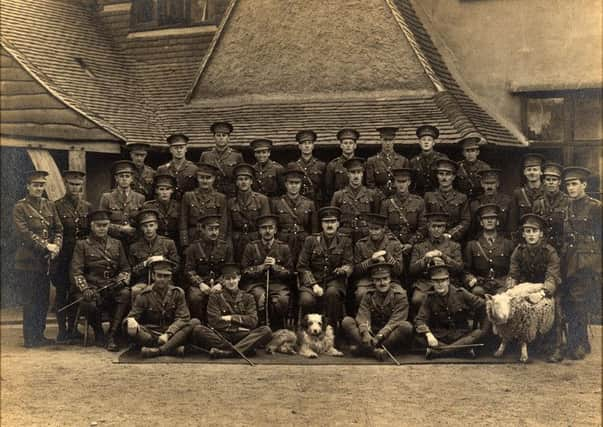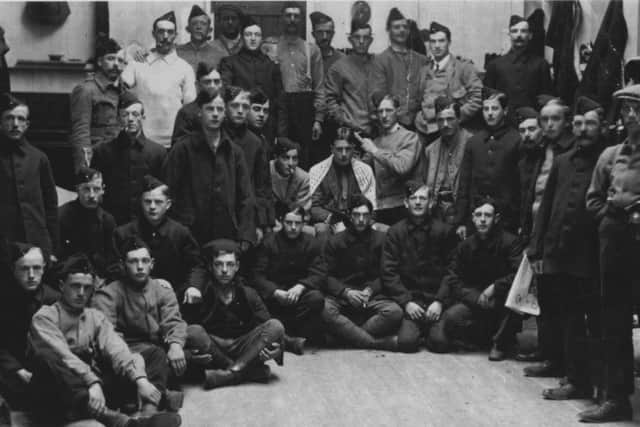Letters home from horrors of World War One


In the latter half of 1916, the West Sussex County Times carried reports of the deaths, woundings, captures and honours of soldiers from the Horsham area.
While many lost their lives, some were captured by the Germans, and eventually allowed to write to their families and put their minds at ease.
Advertisement
Hide AdAdvertisement
Hide AdOne of those men was Frederick Donald Glanville, of Trafalgar Road, Horsham.


He was only 16 years old when he joined the Fusiliers in September 1914.
While no doubt one of the youngest to have answered the call from King and country, Private Glanville survived some of the most terrible battles of the war.
The County Times reported he had “some marvellous escapes at Gallipoli” and was among the last to evacuate the peninsula.
Advertisement
Hide AdAdvertisement
Hide AdHis parents had welcomed him home on leave at the end of May 1916 before he was assigned to the Queen’s Westminster Rifles.


By August, he had been reported ‘wounded and missing’ and no doubt his family feared the worst.
Then came a letter telling them he was a prisoner of war.
It read: “There is no need to worry at all, my wounds are getting on fine and I feel much better in myself although I am still awfully weak. I can only write a few lines at a time and then have to rest a while.
“I wrote as soon as I was allowed to. They took a list of captured to send to the Government many times so you ought to have heard very soon.
Advertisement
Hide AdAdvertisement
Hide Ad“We have been very well treated and everyone is kind to the wounded. We have French and English prisoners to wait on us, who will do anything for us.
“I have only seen three chaps I know here. There is a lot more at other hospitals but I am not very hopeful as we were badly cut up.
“I am very sorry I have heard nothing of Roberts [he was referring to Private Roberts, of Plummers Plain, who was in the same regiment and was, by then, home wounded].
“I dreamt I was being carried on a stretcher down Worthing Road to Mill Bay for a swim, and that they put a bathing costume on me and carried me out to the diving board, stretcher and all.
“Then I awoke with a bump.”
Advertisement
Hide AdAdvertisement
Hide AdMr and Mrs PT Martin, of East Street, also received a letter from their son Lance-Corporal LPR Martin.
Writing on July 15 he said: “Dear mother, all’s well! Thank God I am quite well and under the circs everything goes splendid, and now I am waiting to hear that all is well at home.
“We have been treated very well since the day we were captured, which to my last day I shall never forget.
“As I expect you know, we made an attack. I was one of the first line to go over. A few of us got cut right off and were captured in the German trenches.
Advertisement
Hide AdAdvertisement
Hide Ad“We live in very nice wooden huts and have a space of ground around them where we go when we like for exercise.
“Needless to say, all keep bright and look forward to happy days. All the boys here get parcels from many sources and I should be glad if you will send me parcels of food. I can write two letters and four postcards a month.”
Corporal F Lloyd, of East Street, saw a number of German prisoners during his time at the front, which he described in a letter to his wife, dated July 29.
It read: “We are so busy now we have to turn out all hours of the night and day to take shells up to the guns, as we are firing thousands.
Advertisement
Hide AdAdvertisement
Hide Ad“You can guess where I am if you read the papers and see the different villages we captured.
“I say ‘villages’ but to tell the truth it is only where the villages used to be, as there are only piles of broken bricks now.
“This is a big battle. I have never heard anything like it before, guns and nothing else but guns; the earth trembles with them and the air shrieks with shells.
“There will never be a man want to go to war after what they have seen out here these last few weeks.
Advertisement
Hide AdAdvertisement
Hide Ad“The Germans were dug in the ground dozens of feet deep; it’s a wonder we ever moved them.
“It is a sight round here; I can’t describe it by writing.
“It would interest Mr Eager, especially of a night time, the whole front one mass of flame; one would never believe that men could live under it, but they do and stick it well.
“Britain should feel proud of such men. Only those here know what it is, but it is British pluck, and it will win.
“Our chaps keep bringing in prisoners as they say they can’t put up with artillery fire – it drives them mad. Hundreds of them would ‘chuck’ it, only they can’t get the chance.
Advertisement
Hide AdAdvertisement
Hide Ad“I passed some German prisoners when I was going up to our guns the other night; they looked completely broken up. Never did they think we had such an army.
“I am sorry to say we have had several chaps wounded; it can’t be helped in a fight like this. I have seen some bad sights but the men bear the pain well.
“Our Division got mentioned in army orders of the day for a brilliant attack our infantry made with the help of their artillery, which includes our battery.
“I feel proud of that, you know.”
As the names on the town’s memorials tell us, with war comes death. Second Lieutenant Christopher Stone, of Field Place, Broadbridge Heath, wrote to the wife of Captain CB Grant, who had been killed on July 27, in Delville Wood.
Advertisement
Hide AdAdvertisement
Hide AdLieutenant Stone said: “It was a terrible day and place, and all who were there spoke in glowing terms of Captain Grant, who was here, there and everywhere, helping everyone, unperturbed and cool as ever, although he knew before he started that it was almost certain death.
“Captain Grant was beloved by all in the Battalion. He combined extraordinary ability in his work with a wonderful coolness in danger and charm of manner.
“I needn’t tell you what a fine and gallant fellow he was.”
The Chaplain of the Battalion, the Rev Ernest S John, said: “I have asked many who were near him about him and he seems to have been absolutely magnificent.
“The stretcher bearer who saw him hit says his death was quite instantaneous and that he felt no pain.”
Advertisement
Hide AdAdvertisement
Hide AdDon’t miss out on all the latest breaking news where you live.
Here are four ways you can be sure you’ll be among the first to know what’s going on.
1 Make our website your homepage at www.wscountytimes.co.uk
2 Like our Facebook page at www.facebook.com/wscountytimes
3 Follow us on Twitter @wscountytimes
4 Register with us by clicking on ‘sign in’ (top right corner). You can then receive our daily newsletter AND add your point of view to stories that you read here.
And do share with your family and friends – so they don’t miss out!
The County Times – always the first with your local news.
Be part of it.